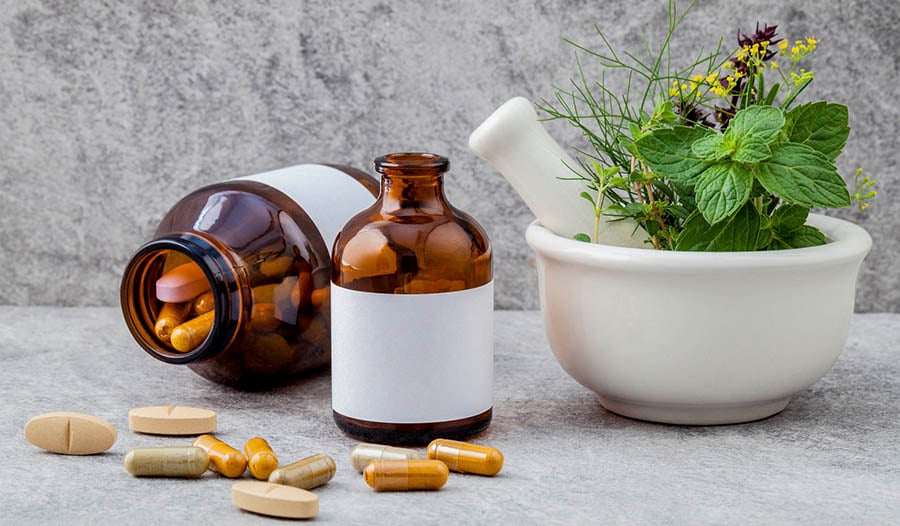The Top 10 Supplements of 2018

Liposomal Vitamin C
Vitamin C, also known as ascorbic acid or ascorbate, has been one of the most researched vitamins over the last 50 years—the scientific literature reveals that over 53,000 studies have been conducted on vitamin C since 1968. The findings show that it helps promote a strong immune system as well as cardiovascular, brain, and skin health among many others benefits.
Symptoms of Vitamin C Deficiency
- Bruising
- Fatigue
- Depression
- Bleeding gums
- Joint and bone pain
- Muscle aches and swelling
Health Benefits of Vitamin C
- Helps treat anemia by assisting iron absorption
- Boasts anti-cancer properties
- Supports collagen and skin
- Optimizes heart health
- Supports the immune system
- Improves memory
- Prevents periodontal disease
- Prevents upper respiratory infections/cold
- Treats sepsis (blood infection)
Vitamin C is a water-soluble vitamin. To help increase absorption, scientists have developed liposomal vitamin C, a fat-soluble covering that helps the ascorbic acid molecule pass through the digestive tract more easily. Suggested dosage: Vitamin C capsules/tablets – 250 mg to 2,000 mg per day. Available in powder and gummies.
Whey Protein
Whey protein is a common supplement used by those who exercise routinely. It is frequently used as a meal replacement by individuals who are trying to maintain or lose weight. Whey is also a popular source of protein for those trying to build muscle and also helps reduce appetite.
Health benefits of whey protein include:
- Provides an excellent source of protein
- Encourages muscle growth
- Lowers blood pressure
- Lowers blood sugar
- Lowers cholesterol
- Helps the liver remove toxins
A 2017 study showed whey protein could help reduce injuries in marathon and amateur runners while a 2018 study in the British Journal of Sports Medicine showed whey protein supplementation helped improve muscle strength and muscle mass. Whey protein is a great addition to a fruit and vegetable smoothie. Alternatively, it can be mixed with water or milk or even a bowl of oatmeal. Suggested dose: As directed on the label.
Probiotics
Humans have somewhere between 50-100 trillion gut bacteria, which come from 1,000 different species collectively known as the microbiome. Over the last decade, doctors have learned that the health of our gut bacteria determines our overall health. When we feed ourselves, we are also feeding out intestinal bacteria. Healthy food encourages the growth of beneficial bacteria while excess consumption of sugary and processed foods encourages the growth of harmful bacteria leading to a condition called leaky gut. Imbalance of the gut microbiome increases risk for the following conditions:
- Depression and anxiety
- Arthritis
- Thyroid abnormalities
- Rheumatoid arthritis/lupus
- Irritable bowel syndrome
- Migraines
- Fibromyalgia/chronic fatigue
Repair of this intestinal imbalance, dysbiosis, is crucial to help restore overall health. Stress reduction, regular exercise and diet choices each play an important role. In addition, avoiding foods that cause discomfort is vital. Probiotics are a class of healthy gut bacteria that come in pill form, and these supplements can play an important part in re-populating the gut with healthy bacteria. But, taking a pill is not enough—eating the right food will help ensure those beneficial bacteria flourish. Suggested dose: 5 billion units and more.
Omega-3 (EPA & DHA) Fatty Acids
Omega-3 essential fatty acids consist primarily of, particularly, eicosapentaenoic acid (EPA) and docosahexaenoic acid (DHA). A 2014 study in Nutrition Journal showed that the majority of people do not consume enough essential fatty acids in their diet. These important nutrients can be found in a variety of food sources, which include fish (mackerel, cod, and salmon are among the richest), walnuts, chia seeds, flax seeds, hemp seeds, avocado, and natto.
A 2017 study in Future Science showed omega-3 fish oils can reduce inflammation that leads to heart disease. Another study the same year in Atherosclerosis showed that higher levels of omega-3 in the blood could reduce death from heart disease, the leading killer of people worldwide, by 30 percent. In addition to optimizing fatty acids in the diet, supplements are also frequently taken. Suggested dose: Omega-3 fish oil 1,000 to 4,000 mg daily
Calcium with Magnesium
Optimizing bone health and muscle mass is crucial for maintaining overall health. Osteopenia and osteoporosis are conditions diagnosed by a doctor when bone density is thinner than expected for a person’s age. For many, bones thin with aging. However, there are things that can be done to help ensure bones remain strong and reduce the chance of breakage. This is frequently done with diet, exercise and supplements like calcium and magnesium in both pill and liquid forms. Learn more about Natural Approaches to Building Strong Bones.
Calcium – Ensuring your diet is high in calcium-rich fruits and vegetables is important for keeping bones strong. It also helps with vascular and muscle function as well as nerve transmission.
Magnesium – An adequate intake of magnesium-rich foods, which include green vegetables, is crucial. Magnesium works together with calcium to make bones strong. It is also great for preventing leg cramps, migraine headaches and, in some cases, heart palpitations.
Collagen
Muscles, bones, skin, and tendons are composed primarily of collagen, the most abundant type of protein in the human body. Collagen consists of 30-35 percent of all the protein in the human body. Collagen protein is also known as connective tissue and is responsible for stabilizing our skin and maintaining joint movement and flexibility. In addition, collagen provides our skin with elasticity. As we age, we lose elasticity, leading to wrinkles and thin skin. Studies show that collagen supplementation has many benefits, including improved bone health and tendon strength, reduced facial wrinkles, optimal hair and nail growth, and diminished cellulite.
There are various formulations of oral collagen supplements available. Some are of bovine (cow) origin while others are marine (fish) origin. I recommend at least 3,000 to 5,000 mg daily be taken. Taking an additional 1,000 to 2,000 mg of vitamin C should also be considered to help optimize collagen strength and production.
Co-Enzyme Q10
Co-enzyme Q10 (CoQ10), also known as ubiquinone, is a naturally occurring anti-oxidant nutrient required for life. Coenzyme Q10 is required for cells to generate energy. This is done, primarily, in a part of the cell doctors call mitochondria, the cellular power plant that generates energy in the body. If the power plant is not generating sufficient energy, fatigue is usually the result.
Since the heart is the most active of all organs, it produces and requires the most CoQ10 in order to meet its metabolic demands. However, in those with cardiac disease, higher levels of CoQ10 are required to help optimize function.
When a supplement is taken, the body will convert 90 percent of CoQ10 into ubiquinol, the active form of supplement. Coenzyme Q10 is helpful in those with the following conditions:
- Migraine headaches
- High blood pressure
- Coronary artery disease
- Congestive heart failure
- Chronic fatigue syndrome
- Fibromyalgia
- Cholesterol reduction
- Prevents progression of macular degeneration
- Tinnitus (ringing in the ears) sufferers may also benefit
- Facial wrinkles may be reduced with topical CoQ10 application
Suggested dose: 100 to 200 mg per day
Multivitamin
A multivitamin should be taken by each and every man and woman. While a well-balanced diet is essential to optimal health, our daily stressors can put additional metabolic demands on our body that may not always be fulfilled by diet alone. Chronic disease affects our nutrient requirements while many popular prescription drugs can also deplete the body of important vitamins and minerals.
On June 19, 2002, a study in the Journal of the American Medical Association recommends that “all adults take one multivitamin daily....” A quality multivitamin provides additional assurance that the body is getting what it needs. If extra nutrients are present, the body will store what it needs and eliminate the additional. For women under 50, a multivitamin with iron is frequently taken. However, unless a man has been told to supplement with iron, men’s multivitamins should not include it.
Ensuring your multivitamin has iodine in it is also important as studies show that more than 10 percent of people worldwide may be deficient in this vital nutrient. A 2011 study in Thyroid demonstrated that almost 10 percent of people in the United States had moderate to severe iodine deficiency, and at least an additional five percent are mildly deficient. This deficiency is likely higher in other parts of the world due to lack of iodine fortification of salt. Suggested dose: As directed on the label
Biotin for Skin, Nails and Hair
Biotin is a B vitamin, also known as vitamin B7. This vitamin, found in foods such as eggs, meat, nuts and seeds, helps the body make energy out of fats, carbohydrates and proteins. Frequently recommended for all types of hair loss, studies have shown the benefit of biotin when taken with other nutrients (such a zinc, vitamin C, E and magnesium) for telogen effluvium specifically, a reversible condition in which one’s hair falls out after a stressful experience. A 2016 study in the International Journal of Trichology showed biotin deficiency in 38 percent of women who had hair loss. Suggested dose: As directed on the label
N-Acetyl Cysteine and Glutathione
N-Acetyl Cysteine (NAC) is a nutritional supplement, which the body converts to glutathione. Glutathione is also available in the supplement form. When present in adequate quantities, it helps protect the liver from toxins, such as acetaminophen (paracetamol), alcohol and others found in the environment. Suggested dose: As directed on the label.
References:
- J Am Coll Nutr. 2017 Oct 31:1-11. doi: 10.1080/07315724.2017.1344591. Benefits of Whey Protein [Epub ahead of print]
- Int J Med Sci. 2017 Jun 22;14(7):648-654. doi: 10.7150/ijms.19584. eCollection 2017.
- British Journal of Sports Medicine. 2018 Mar;52(6):376-384. doi: 10.1136/bjsports-2017-097608. Epub 2017 Jul 11.
- Papanikolaou Y, Brooks J, Reider C, Fulgoni VL. U.S. adults are not meeting recommended levels for fish and omega-3 fatty acid intake: results of an analysis using observational data from NHANES 2003–2008. Nutrition Journal. 2014;13:31. doi:10.1186/1475-2891-13-31.
- Bäck M. Omega-3 fatty acids in atherosclerosis and coronary artery disease. Future Science OA. 2017;3(4):FSO236. doi:10.4155/fsoa-2017-0067.
- Atherosclerosis. 2017 Jul;262:51-54. doi: 10.1016/j.atherosclerosis.2017.05.007. Epub 2017 May 6.
- Macular Degeneration http://www.eurekaselect.com/154613/article
- Otolaryngol Head Neck Surg. 2007 Jan;136(1):72-7.
- Biofactors. 2017 Jan 2;43(1):132-140. doi: 10.1002/biof.1316. Epub 2016 Aug 22.
- Fletcher RH, Fairfield KM. Vitamins for Chronic Disease Prevention in Adults Clinical Applications. JAMA.2002;287(23):3127–3129. doi:10.1001/jama.287.23.3127
- Thyroid. 2013 May;23(5):523-8. doi: 10.1089/thy.2013.0128. Epub 2013 Apr 18.
- Thyroid. 2011 Apr;21(4):419-27. doi: 10.1089/thy.2010.0077. (Note: Iodine deficiency in the United States is higher than 10% of the population. I suspect upwards towards 20% using the WHO urinary value of 100 mg/L or less being deficient)
- Clin Cosmet Investig Dermatol. 2018 Sep 10;11:431-436. doi: 10.2147/CCID.S173082. eCollection 2018.
- Serum Biotin Levels in Women Complaining of Hair Loss. International Journal of Trichology. 2016;8(2):73-7.
- Fundam Clin Pharmacol. 2018 Nov 24. doi: 10.1111/fcp.12437. (NAC and Acetaminophen)
DISCLAIMER:This Wellness Hub does not intend to provide diagnosis...
















































































 Table of Contents
Table of Contents
















